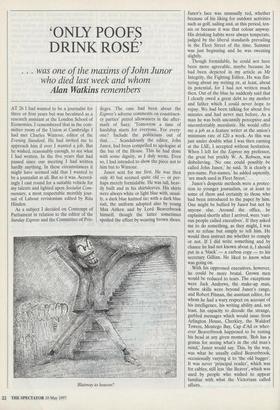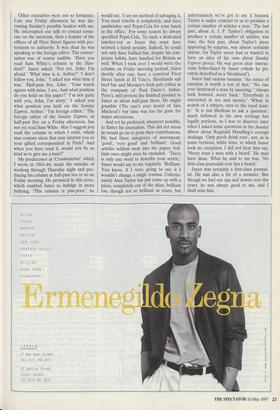'ONLY POOFS DRINK ROSE'
. was one of the maxims of John Junor
who died last week and whom Alan Watkins remembers AT 26 I had wanted to be a journalist for three or four years but was becalmed as a research assistant at the London School of Economics. I remembered that in the com- mittee room of the Union at Cambridge I had met Charles Wintour, editor of the Evening Standard. He had invited me to approach him if ever I wanted a job. But he wished, reasonably enough, to see what I had written. In the five years that had passed since our meeting I had written hardly anything. In these circumstances it might have seemed odd that I wanted to be a journalist at all. But so it was. Accord- ingly I cast round for a suitable vehicle for my talents and lighted upon Socialist Com- mentary, a most respectable monthly jour- nal of Labour revisionism edited by Rita Hinden.
As a subject I decided on Contempt of Parliament in relation to the editor of the Sunday Express and the Committee of Priv- ileges. The case had been about the Express's adverse comments on constituen- cy parties' petrol allowances in the after- math of Suez: 'Tomorrow a time of hardship starts for everyone. For every- one? Include the politicians out of that. . . .' Scandalously the editor, John Junor, had been compelled to apologise at the bar of the House. This he had done with some dignity, as I duly wrote. Even so, I had intended to show the piece not to him but to Wintour.
Junor sent for me first. He was then only 40 but seemed quite old — or per- haps merely formidable. He was tall, heav- ily built and in his shirtsleeves. His shirts were always white or light blue with, usual- ly, a dark blue knitted tie; with a dark blue suit, the uniform adopted also by young Max Aitken and by Lord Beaverbrook himself, though the latter sometimes spoiled the effect by wearing brown shoes.
Blairway to heaven? Junor's face was unusually red, whether because of his liking for outdoor activities such as golf, sailing and, at this period, ten- nis or because it was that colour anyway. His drinking habits were always temperate, judged by the liberal standards prevailing in the Fleet Street of the time. Summer was just beginning and he was sweating slightly.
Though formidable, he could not have been more agreeable, maybe because he had been depicted in my article as Mr Integrity, the Fighting Editor. He was flat- tering about my writing or, at least, about its potential, for I had not written much then. Out of the blue he suddenly said that I clearly owed a great debt to my mother and father which I could never hope to repay. We had been talking for about five minutes and had never met before. As a man he was both uncannily perceptive and uncomfortably moralistic. He would offer me a job as a feature writer at the union's minimum rate of £20 a week. As this was just under double what I was then earning at the LSE, I accepted without hesitation. When I left for the Express my professor, the great but prickly W. A. Robson, was disbelieving. 'No one could possibly be called John Junor,' he said. 'It is clearly a pen-name. Pen-names,' he added sapiently, `are much used in Fleet Street.'
Junor's despotic methods were a protec- tion to younger journalists, or at least to some of them and certainly to those who had been introduced to the paper by him. One might be bullied by Junor but not by anyone else. Around the office, he explained shortly after I arrived, were 'vari- ous people called executives'. If they asked me to do something, as they might, I was not to refuse but simply to tell him. He would then instruct me whether to comply or not. If I did write something and by chance he had not known about it, I should put in a 'black' — a carbon copy — to his secretary Gillian. He liked to know what was going on.
With his oppressed executives, however, he could be more brutal. Grown men would be reduced to tears. The exceptions were Jack Andrews, the make-up man, whose skills were beyond Junor's range, and Robert Pitman, the assistant editor, for whom he had a wary respect on account of his intelligence, his writing ability and, not least, his capacity to decode the strange, garbled messages which would issue from Arlington House, Cherldey, the Waldorf Towers, Montego Bay, Cap d'Ail or wher- ever Beaverbrook happened to be resting his head at any given moment. 'Bob has a genius for seeing what's in the old man's mind,' Junor would say. This, by the way, was what he usually called Beaverbrook, occasionally varying it to 'the old bugger'. It was never 'principal reader', which was for cables; still less 'the Beaver', which was used by people who wished to appear familiar with what the Victorians called affairs. Other executives were not so fortunate. Late one Friday afternoon he was dis- cussing Sunday's possible leaders with me. He interrupted our talk to contact some- one on the intercom, then a feature of the offices of all Fleet Street figures with pre- tensions to authority. It was clear he was speaking to the foreign editor. The conver- sation was of course audible. 'Have you read Sam White's column in the Stan- dard?' Junor asked. 'Not yet, John, I'm afraid.' What time is it, Arthur?' I don't follow you, John.' I asked you what time it was.' Half-past five, John.' Your watch agrees with mine, I see. And what position do you hold on this paper?' I'm not quite with you, John, I'm sorry.' 'I asked you what position you held on the Sunday Express, Arthur.' I'm foreign editor.' The foreign editor of the Sunday Express, at half-past five on a Friday afternoon, has not yet read Sam White. May I suggest you read the column to which I refer, which may contain ideas that may interest you or your gifted correspondent in Paris? And when you have read it, would you be so kind as to give me a buzz?'
My predecessor as `Crossbencher', which I wrote in 1963-64, made the mistake of working through Thursday night and pro- ducing his column at half-past ten or so on Friday morning. He persisted in this error, which enabled Junor to indulge in more bullying. 'This column is piss-poor,' he would say. 'I see no method of salvaging it. You must rewrite it completely, and have sandwiches and Pepsi-Cola for your lunch in the office.' For some reason he always specified Pepsi-Cola. To such a dedicated luncher-out as Junor this must have seemed a harsh penalty. Indeed, he could not only have bullied but, despite his tem- perate habits, have lunched for Britain as well. When I took over I would write the column on Friday morning instead, finish shortly after one, have a convivial Fleet Street lunch at El Vino's, Shortlands salt beef bar and Mooney's Irish pub (often in the company of Paul Dacre's father, Peter), and present the finished product to Junor at about half-past three. He might grumble (`No one's ever heard of lain Macleod') but time was too far gone for major alterations.
And yet he preferred, whenever possible, to flatter his journalists. This did not mean he would go on to print their contributions. He had three categories of assessment: 'good', 'very good' and 'brilliant'. Good articles seldom went into the paper; bril- liant ones might even be excluded. 'There is only one word to describe your article,' Junor would say to me regularly. 'Brilliant. You know, if I were going to use it I wouldn't change a single comma. Unfortu- nately Alan Taylor has just come up with a piece, completely out of the skies, brilliant too, though not so brilliant as yours, but unfortunately we've got to use it because Taylor is under contract to us to produce a certain number of articles a year.' The last part, about A. J. P. Taylor's obligation to produce a certain number of articles, was true; the first part, about Taylor's piece appearing by surprise, was almost certainly untrue, for Taylor never had or wanted to have an idea of his own about Sunday Express pieces. He was given clear instruc- tions beforehand by Junor (whom he pri- vately described as a 'blockhead).
Junor had various maxims: 'An ounce of emotion is worth a ton of fact.' No one ever destroyed a man by sneering.' Always look forward, never back.' Everybody is interested in sex and money.' When in search of a subject, turn to the royal fami- ly.' It is not libellous to ask a question': much followed in his own writings but legally perilous, as I was to discover later when I asked some questions in the Sunday Mirror about Reginald Maudling's corrupt dealings. 'Only poofs drink rosé', not, as in some versions, white wine, to which Junor took no exception. I did not hear him say, 'Never trust a man with a beard.' He may have done. What he said to me was, 'No first-class journalist ever has a beard.'
Junor was certainly a first-class journal- ist. He was also a bit of a monster. But though we had our ups and downs over the years, he was always good to me, and I shall miss him.



































































 Previous page
Previous page